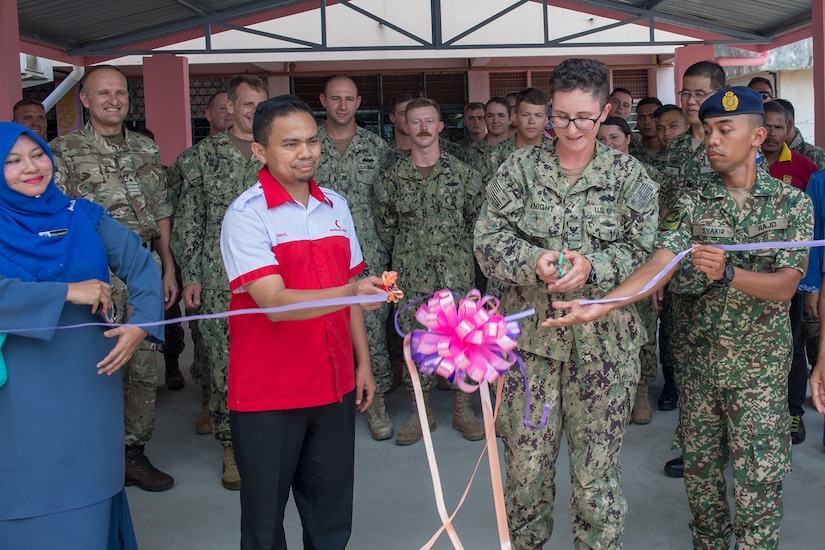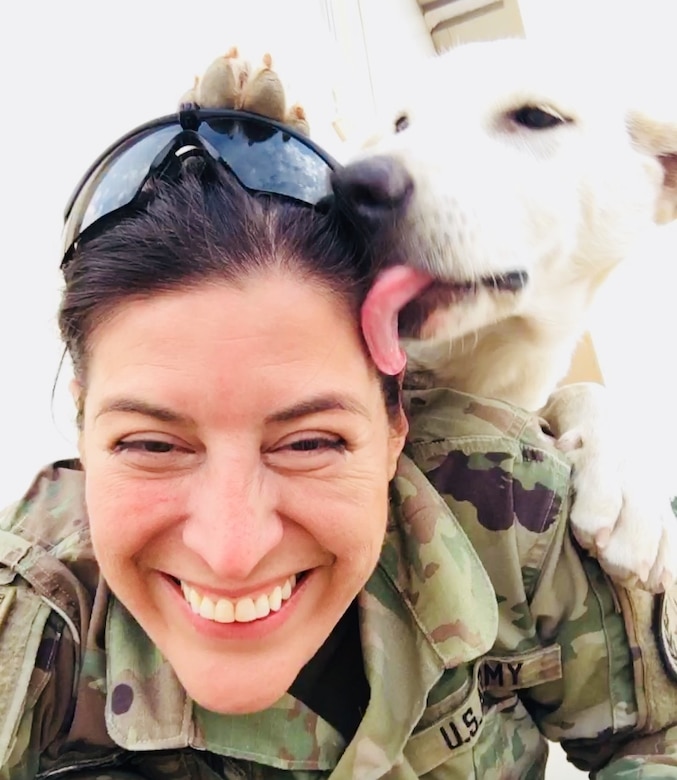By Ken Scar, U.S. Army Cadet Command
IRBIL, Iraq -- Army Reserve Sgt. Tracy McKithern loves dogs.
Last year, when McKithern found a little female white stray
dog sniffing around camp here during her yearlong deployment to Iraq -- only
one thing was going to happen.
“I fell in love with her immediately,” she said.
McKithern, a combat photographer from Tampa, Florida, with
the 982nd Combat Camera Company (Airborne), was stationed at the Kurdistan
Training Coordination Center, a multinational military organization responsible
for the training of peshmerga and Iraqi security forces in and around Irbil,
from April 2017 to January 2018.
The little dog and her mother had been wandering around the
base for weeks, McKithern found out. Stray dogs are common in Iraq, and the
culture is not kind to them. Erby and her mom were kicked and hit with rocks
daily and starving. Her brother and sister had disappeared before McKithern
arrived.
‘Sweetest Little Soul’
Despite her rough experiences with humans to that point,
Erby ran right up to McKithern the first time she held out her hand to the
shaky little pup covered in scratches and dirt.
“She loved everyone,” McKithern said of Erby. “She is the
sweetest little soul. She came up to me immediately -- probably hungry, but
gentle. I think she was looking for love more than anything else.”
McKithern, together with soldiers from the Italian and
German armies her unit was partnered with, started caring for the little dog.
They named her Erby Kasima, after nearby Irbil, the largest city in northern
Iraq, and “Kasima” being the Arabic name for beauty and elegance.
The coalition soldiers would go on convoys into the
surrounding countryside to train Iraqi army units six days a week, with
McKithern documenting the missions. Every time they returned to the base, Erby
was waiting.
“She ran up to our convoy every day,” McKithern recalled.
“She was so tiny she would fall and trip all over herself to get to us.”
Getting Healthy
It didn’t take long for Erby and her mom to realize that,
not only were they safe around McKithern and her Italian and German friends,
but these humans would feed them, too. As the weeks went by, the dogs’ wounds
began to heal and they started putting on weight.
Eventually, the growing pup took to sleeping on the step
outside McKithern’s quarters.
As the end of her deployment approached, McKithern started
to wonder how she could ever leave Erby behind when she went back to the states
and lamented about it on her Facebook page.
“One night I posted a pic of us on Facebook, with a caption
that read something like, ‘I wish I could take her home,’” McKithern recalled.
“I went to sleep, woke up and my friends and family had posted links to various
rescue groups. I reached out to one of them, the nonprofit Puppy Rescue
Mission, and they responded immediately. We sent them $1,000 and they set up a
crowd fund to get the rest. We needed an additional $3,500.”
Generous Donors, Friends’ Help
The immediate outpouring of generosity was astounding,
McKithern said.
“We raised the rest of the money very quickly, and most of
it was from complete strangers!” she said.
McKithern had many preparations to make before she left Iraq
so Erby could eventually follow her. Vaccinations, documentation, travel
arrangements -- all had to be done somehow, in a war zone, while she fulfilled
her military duties. It seemed like an overwhelming task in an already
overwhelming situation. Even though she now had the funding, McKithern began to
lose hope that she’d have the time and energy to complete needed details so
Erby could join her in the states.
That’s when several Kurdish and German officers that
McKithern knew stepped in to help. They offered to complete anything she
couldn’t get done and get Erby onto the plane. With their help, McKithern
returned home and Erby was set to follow her several weeks later.
Change in Plans
McKithern had only been home in Florida for about a month
when she received orders for a 67-day mission to Fort McCoy, Wisconsin. She was
to depart March 11, the very day Erby was scheduled to arrive at John F.
Kennedy International Airport in New York City.
“I couldn’t believe it!” McKithern said. “But I’m a soldier
first, and my commander received an email looking for volunteers.” McKithern
said the gunnery exercise at Fort McCoy was an important mission and so she
deployed to Wisconsin.
Reunion
However, McKithern’s husband, Army Sgt. Wes McKithern, who’s
also a combat cameraman for the 982nd, met Erby at the airport in New York and
drove her home to Tampa, where she’s waiting patiently to be reunited with her
rescuer.
In a few short weeks, McKithern will fly home from Fort
McCoy to be with Erby at last. It will be the end of a 16-month journey that’s
taken her across the world to find a little dog in a war zone -- and with the
help of generous strangers, a nonprofit dog rescue, and soldiers from three
different armies -- bring her all the way back to become part of a family.
“I can’t believe it,” McKithern said. “It feels like a
miracle is happening.”









